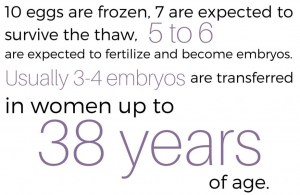 Many single women in the U.S. grapple with the decision of whether or not to freeze their eggs. So, what is the right age to freeze your eggs to help preserve your pregnancy chances at a later date?
Many single women in the U.S. grapple with the decision of whether or not to freeze their eggs. So, what is the right age to freeze your eggs to help preserve your pregnancy chances at a later date?
Why Pursue Egg Freezing?
If you believe you’ll need to pursue in vitro fertilization (IVF) one day in order to grow your family, freezing your eggs is worth considering. Medical reasons to pursue IVF can include tubal blocking, an ovulation disorder or having a partner with male infertility issues.
Although IVF is a great option for women, the reality is that the process is expensive and proves unsuccessful for many. The Mayo Clinic estimates between 2-5% of pregnancies initiated by IVF are ectopic, which means the egg has been fertilized outside of the uterus and is therefore not viable.
When Should You Freeze Your Eggs?
In general, women under the age of 35 are able to retrieve more eggs through the freezing procedure than women older than 35. Check out the approximate live birth rate for women for each IVF cycle:
- 41-43% for women younger than 35
- 33-36% for women ages 35 to 37
- 23-27% for women ages 38 to 40
- 13-18% for women older than 40
 Although freezing eggs when you’re younger increases the chances that the eggs will be viable when you choose to use them, freezing eggs at a younger age also increases the likelihood that you won’t actually need to. A woman in her 20s or early 30s who elects to freeze her eggs may feel secure in the short term, but could very well end up finding the right partner and conceiving naturally. In fact, just 10-20% of women who freeze their eggs ever end up using them.
Although freezing eggs when you’re younger increases the chances that the eggs will be viable when you choose to use them, freezing eggs at a younger age also increases the likelihood that you won’t actually need to. A woman in her 20s or early 30s who elects to freeze her eggs may feel secure in the short term, but could very well end up finding the right partner and conceiving naturally. In fact, just 10-20% of women who freeze their eggs ever end up using them.
So this raises a difficult question: if older women are more likely to need their eggs, but aren’t as likely to have their eggs work, what is the right choice? One study found the age of 37 to be the optimal age for egg freezing when considering cost-effectiveness and actual need alongside health of the eggs.
An Investment in Your Future
Egg freezing is best looked at as an investment in your own future. The investment begins with the upfront cost followed by annual storage fees, which can vary slightly from one clinic to the next.
When women choose to freeze their eggs, they are leaving the door open to pursue a healthy pregnancy when the time is right.





